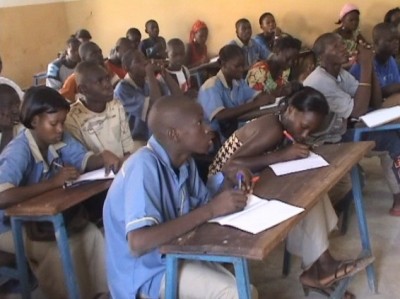While Mali is trying to reunite in its large territory strained by a prolonged internal conflict between the north and the rest of the country, its young people are impatient to move forward to build Mali's future. My Rights, My Voice, Mali is a project led by Malian youth and supported by Oxfam to promote their rights to education and sexual and reproductive health.
The context
Although 80 percent of Mali’s children enrolled in primary school in 2010-11 school year, the system struggles to give them a quality education. Almost half abandon their schooling early, while many complete school without basic reading, writing and mathematical skills. The education system is also plagued by a lack of schools in rural areas, as well as shortages of teachers and materials.
Laya Diarra, a blogger for Afribone in Bamako explains that finishing primary school is often not enough to solve the literacy issue [fr]:
Il a été constaté que les enfants qui terminaient le 1er Cycle de l’Enseignement Fondamental retombaient très vite dans l’illettrisme. Cet enseignement ne garantissait pas le minimum éducatif que le système se donnait comme objectif.
Statistics show that many children who completed primary school fell quickly back into illiteracy. This formation did not guarantee the minimum objectives that the educational system aims for.
Additionally, the gender gap in access to education is still a major subject of concern. In 2008, more than 80,000 students passed exams to enter secondary schools, yet around 17,000 — 40 percent of whom were girls — were denied placement in secondary schools. Marianne Opheim, an education researcher, explained that the gender gap is not as large as it may seem [fr]:
Tout en reconnaissant l'importance des facteurs particuliers au statut de la femme, je pense que la sous-scolarisation des filles est étroitement liée aux grands défis généraux de l'école malienne, tels que l'écart linguistique et culturel entre l'école et le foyer
While it is important to recognize the importance of specific factors linked to women status, I think the under-enrollment of girls in school is closely linked to the general challenges of the Malian school system, such as the linguistic and cultural gap between their school and their home.
Some solutions
Mali faces a shortage of teachers (only one per 100 pupils in some areas), poor teacher training, a lack of classroom materials and an outdated curriculum. Still, some schools are rising to the challenges, like the Mohamed Diallo Primary School. In the following French-language video, the director argues that despite many challenges, the school was able to meet its goals thanks to the dedication of the teachers:
The education authorities’ lack of accountability and transparency in financial management means legal standards are not upheld and policies such as the national girls’ education policy are not implemented.
Working with partners in Mali such as the Education for All coalition, My Rights, My Voice is advocating for an improved national curriculum, including life skills and sexual and reproductive health rights. They also train youth groups to monitor policy implementation so that they can hold the government accountable to its commitments to provide quality education for all Mali’s children and to promote girls’ schooling in particular.









2 comments
A look into the growing number of dissertations written on team building activities by students. The article looks at how students request help from team building professionals. c homework help.